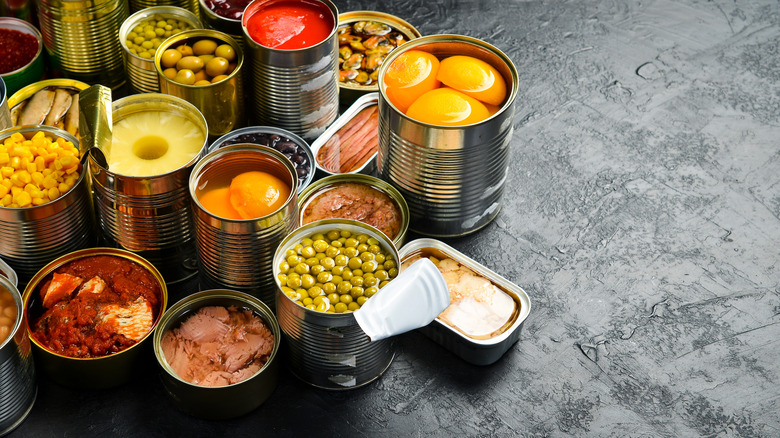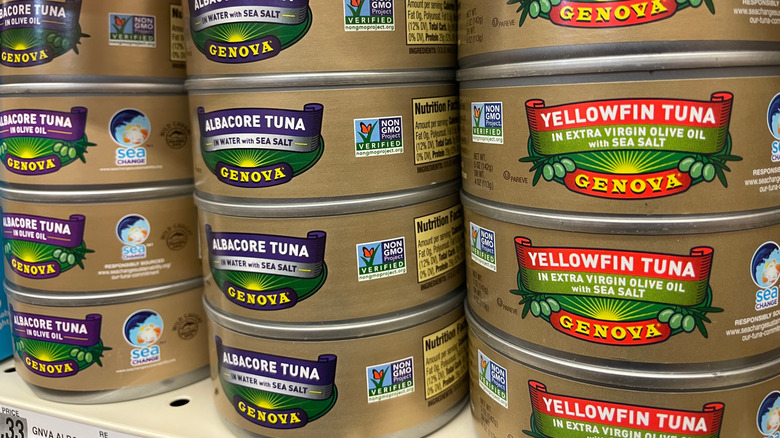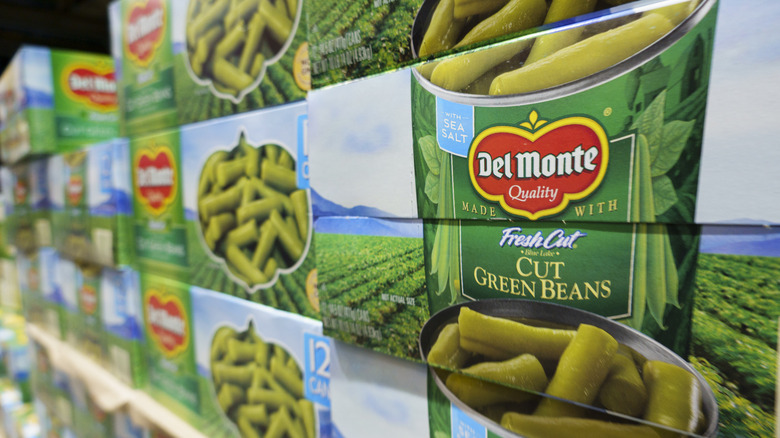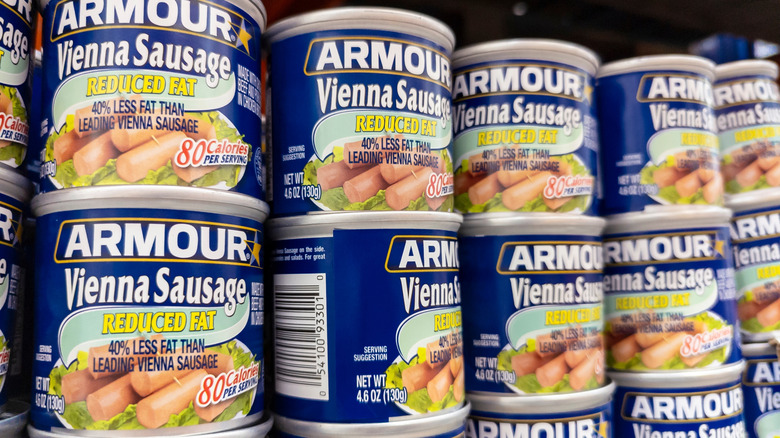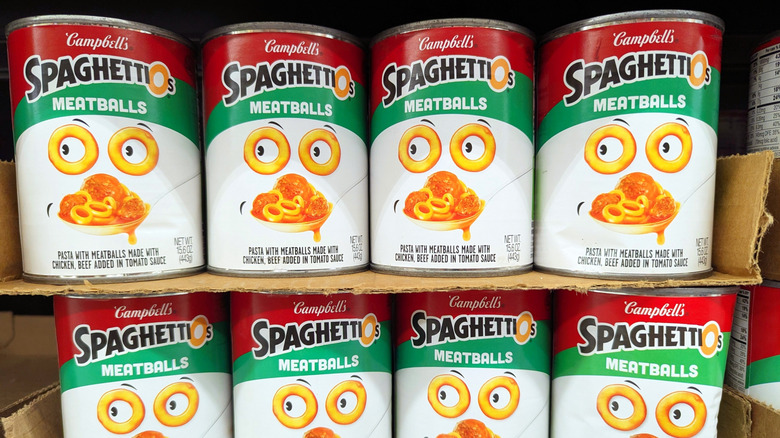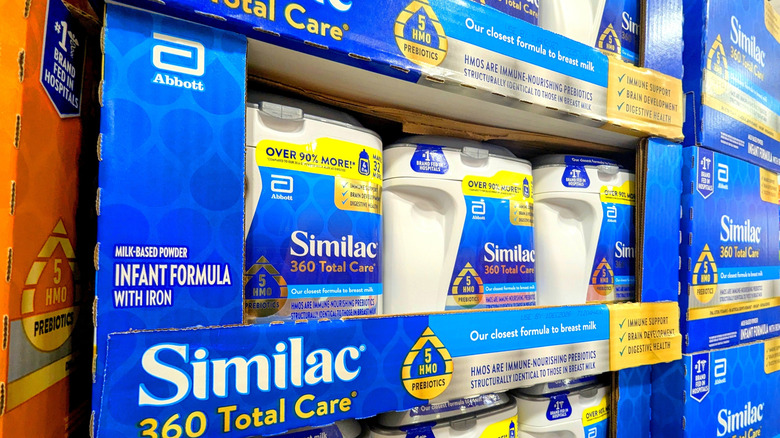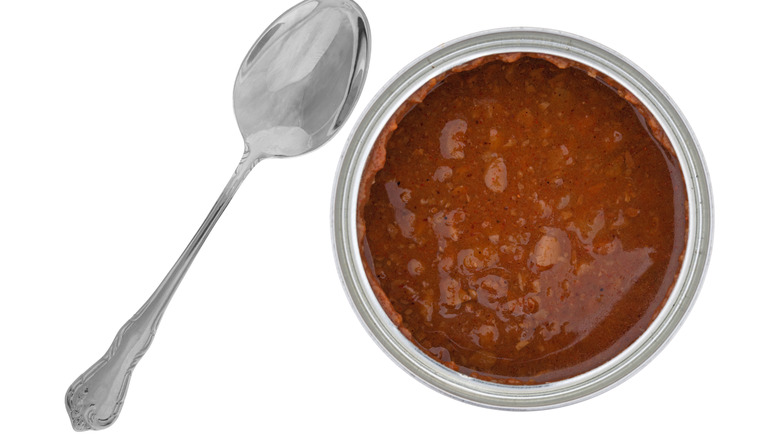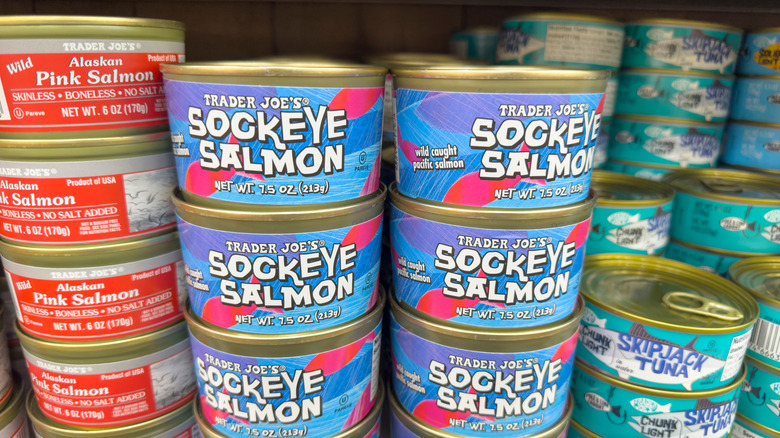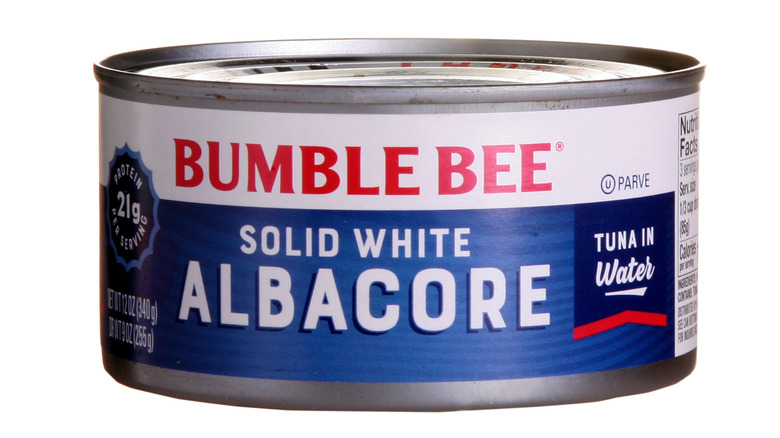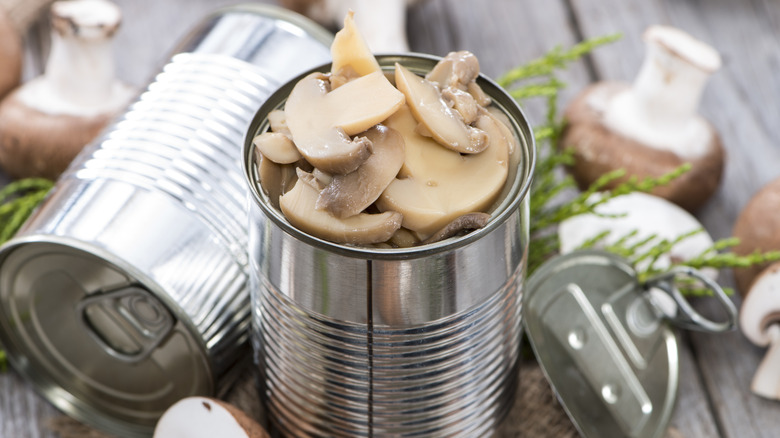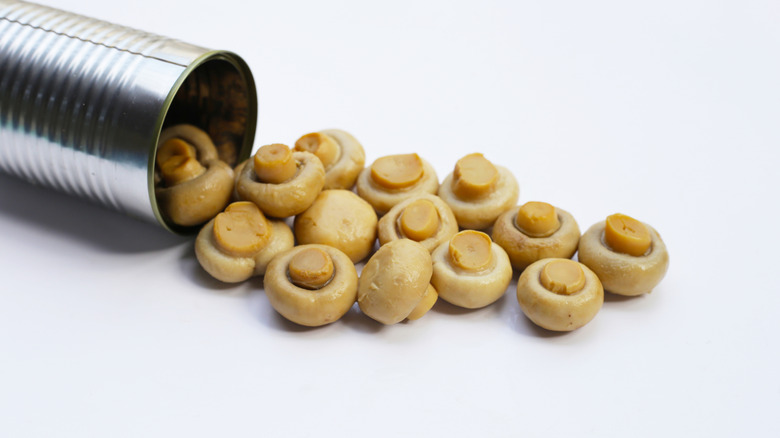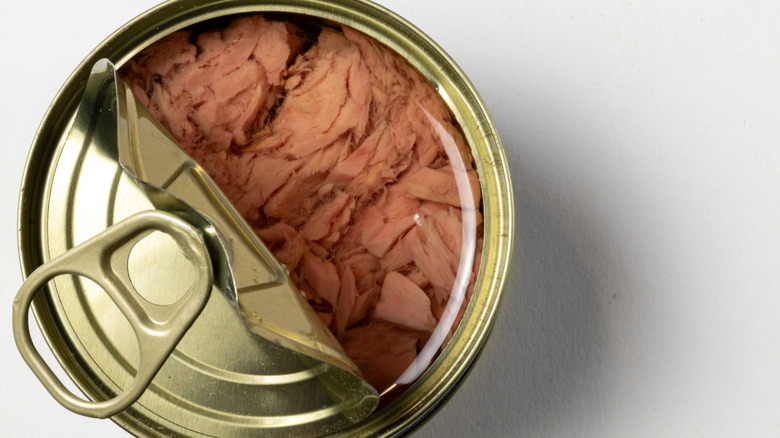Massive Canned Food Recalls That Swept Across The US
Canned food exists on a spectrum. On one end, you've got goodies like Sweet Harvest pineapple slices, which to some people taste just as good as any freshly cut pineapple out there. And on the other, you've got a variety of canned proteins and vegetables, soups and dairy, and so much more.
And while most shoppers know how to tread that fine line between the good canned food and the ones you should avoid, for some, it's just not worth the trouble. But love it or loathe it, there's one thing everyone can agree on about canned food: It's dependable. As long as the can stays intact, canned food can sit on the shelf for a very long time.
Still, it's wise to err on the side of caution — because unlike longevity, safety isn't always guaranteed. To illustrate just how badly your favorite canned meal can fail the safety test, we'll take a look at some of the worst canned food recalls in American history.
Tri-Union Seafoods (2025)
Any tuna snob will tell you: Brand matters when it comes to picking out canned tuna. Sometimes swapping one brand of albacore for another feels like night and day. But other times? There's barely a difference — at least not when it comes to processing standards. Never has that been more apparent than in February 2025, when the FDA issued a recall for tinned tuna spanning multiple brands, including Genova, H-E-B, Trader Joe's, and Van Camp's due to defective packaging.
Why so many brands you may ask. Well, while it's easy to think each canned tuna brand you come across is from its own pristine factory, the truth is a lot of them are same-same but different — produced by the same industrial-scale suppliers under identical production standards. In this case that supplier was Tri-Union Seafoods. So when Tri-Union discovered a defect in the pull-tab mechanism on its tins — something that could lead to leaking and/or contamination — it meant that all those brands had to pull their tuna off the shelves.
Del Monte Foods (2025)
While canned beans can certainly be eaten straight from the can, sometimes they can use a bit of an upgrade. That's where a sprinkling of parmesan, some minced garlic, or even a squeeze of lemon juice comes in handy. What doesn't help? A foreign object you didn't even throw in yourself in a flight of whimsy.
But that's exactly what lovers of Good & Gather cut green beans had to contend with in February 2025, after Del Monte Foods Inc., the food giant behind the popular brand, discovered the product contained an unspecified foreign object. As a result, 197,808 cans of the tainted green beans, which were already on the shelves of Target stores across approximately 21 states, were pulled from circulation.
Neither Del Monte Foods nor the FDA disclosed exactly what the foreign object was. However, the recall was issued under Class II, a category typically reserved for products that pose a low risk of major health issues or may only cause short-lived, reversible symptoms. Still, ingesting any foreign object with your canned food is never a good idea. Sure, it could be small and inert enough that you get away with no side effects whatsoever. But if it's indigestible — and you eat enough of it — you could end up with a nasty intestinal obstruction, something that's unlikely to go away without a visit to the emergency room.
Conagra Brands (2023)
You've probably heard those tall tales about canned meat being safe to eat even after 100 years in storage. And the truth is, they're not as far-fetched as they sound. Canned meat really can sit on your pantry shelf for as long as you like ... assuming you don't mind it tasting a bit off after the two to five year sweet spot.
Something to remember, though, is that all that hinges on one thing; the can staying intact from the moment it leaves the factory floor. But, as Iowa-based meat packer Conagra Brands can attest, that's not always something you can always count on. In January 2023, the company found itself recalling a staggering 2,581,816 pounds of canned meat and poultry spanning multiple household names, including Armour Star, Great Value, Kroger, Valrico, Hargis, and Hereford, after a post-shipment inspection revealed leakage in batches produced between December 12, 2022 and January 13, 2023.
While no illnesses were reported, eating meat or poultry from a leaking — or otherwise damaged — can is a terrible idea. Canned foods are only as safe as the integrity of their packaging. If that's compromised, dangerous microbes like Salmonella, Listeria, or even Clostridium Botulinum can find their way in, then your quick and easy meal becomes a fast track to food poisoning or worse.
Sager Creek Foods (2016)
Canned green beans are among the most underrated canned foods out there. And that's not just because they're conveniently precooked and pre-salted right out of the can. They're also a relatively inexpensive way to boost your protein intake, especially if you're allergic to any of the many animal-based protein options on the market. But sometimes, the road to avoiding severe anaphylaxis can, ironically, lead you straight to it.
Tough to imagine? Well, take the case of Sager Creek Foods, a subsidiary of Del Monte Foods, which in 2016 recalled 15,000 cases of cut green beans and peas spanning multiple labels including Allens, Reliance BL, Monarch SWD, Monarch Mixed, and Silver Source SH/C due to undeclared shellfish allergen.
The worst part? The products were already in circulation in more than 20 states (primarily in Southern and Midwestern regions) at the time of the recall. And with an estimated 2% of the American population allergic to shellfish, it was only a matter of time before something terrible happened. The something terrible being an allergic reaction, which could present as anything from a rash that fades in hours to trouble breathing and life-threatening heart complications. Thankfully, despite those high odds, no illnesses or adverse reactions were reported.
Skipanon Brand Seafoods LLC (2015)
If freezing doesn't quite cut it for your seafood preservation needs, you might want to reach for canned products on your next grocery run. Unlike frozen seafood, you likely won't need to throw out your canned seafood because you couldn't decide whether to refreeze it after it thawed out during a power outage. Something to keep in mind is that canning is a finicky process. Even small errors, like sudden pressure drops or inverting the cans immediately after processing, can have disastrous consequences. And such mishaps don't happen as rarely as you'd like.
Just ask Oregon-based seafood manufacturer Skipanon Brand Seafoods, who in 2015 recalled multiple lots of seafood including albacore tuna, coho salmon, sockeye salmon, steelhead, and sturgeon due to potential contamination with Clostridium botulinum. The massive recall was initiated after an FDA inspection revealed that a batch of products distributed to retailers in four states in September of that year had been under-processed.
Clostridium botulinum is a textbook troublemaker in the canned seafood industry. All it takes is a slight mishap at the cannery for its spores — stubborn enough to survive even extreme heat — to become activated. Add the low-oxygen environment created by canning and the low-acid content of canned seafood, and you've got the perfect breeding ground. By the time such canned products reach the grocery store shelf, they'll be laced with botulinum toxin — a dangerous neurotoxin that's been implicated in multiple disastrous food-related disease outbreaks over the years.
Campbell Soup Company (2010)
Whether it's Chef Boyardee Beef Ravioli or Campbell's SpaghettiOs, there's something (maybe it's the nostalgia) about canned pasta that just can't be beat. But tread carefully, because rather than bringing about fond memories of your childhood, a can of SpaghettiOs might just as easily root you firmly in the present with a bad case of food poisoning.
Canned pasta can become a health hazard for all kinds of reasons, and in 2010, lovers of Campbell's SpaghettiOs got to tangle with one of the most common ones; underprocessing. Discovered after a routine warehouse inspection, the issue affected batches of SpaghettiOs produced between December 2008 and June 2010, and resulted in a staggering 15 million pounds of product being removed from circulation.
Underprocessed pasta may not carry all the telltale signs of spoilage, like a sketchy coloring or an iffy odor. However, it can still conceal numerous unseen hazards — the most concerning being botulinum toxin, a potentially lethal toxin that can accumulate rapidly in underprocessed canned foods. The worst part? You can't see, smell, or taste it, so if it slips past the canning process, there's very little you can do to avoid consuming it.
Abbott Laboratories (2010)
The sterile environment created by canning is not only great for extending the shelf life of your seafood, meats, and vegetables — it's also a great way to protect delicate consumer goods, like baby formula, from contamination. But even pressure sterilization has its limits and may not be nearly enough for some things — such as full-grown insects.
That's something Illinois-based healthcare giant Abbott Laboratories learned the hard way back in 2010, when it was forced to recall approximately 5 million cans of Similac powdered infant formulas after they were found to be contaminated with beetles and/or their larvae. The voluntary recall — estimated by to have cost the company a whopping $100 million in lost sales revenue — was initiated after two consumers reported finding beetles in their baby formula.
In a statement, Abbott spokesperson Melissa Brotz said that follow-up testing ruled out beetle contamination in 99.8 percent of the affected product line, which had been distributed to retailers in the United States, Puerto Rico, Guam, and the Caribbean. Despite these reassuring stats, a recall was still deemed necessary. Per the FDA, consuming baby formula tainted with beetles or their larvae could cause mild stomach upset in infants and potentially interfere with their feeding.
Castleberry Food Company (2007)
If you're not eating canned foods straight from the can, you might be able to save yourself from some of the more common woes of improperly canned goods, like Salmonella and Listeria. But even boiling your canned food to oblivion won't save you from the most dangerous contaminant: Clostridium botulinum. To keep this nasty bacteria out of tinned goods, you need extreme heat; the kind only a commercial pressure canner can deliver. But even that's not foolproof. Just ask Georgia-based Castleberry Food Company, which in 2007 had to track down a staggering 111 million cans of food, including meats and chili sauce, after they were linked to a botulism outbreak that sickened eight people in Texas, Ohio, and Indiana.
CDC traceback investigations found traces of botulinum toxin in leftover hot dog chili sauce consumed by one of the infected individuals, triggering a recall of 39 million cans of that specific product. However, a follow-up FDA investigation at the company's Georgia plant uncovered contamination in several other Castleberry products. Inspectors also flagged a slew of violations, including busted canning equipment, useless alarm indicator lights, and temperature monitors that weren't properly set up. In the end, Castleberry had to recall nearly every product line made at the Georgia plant.
Nefco-Fidalgo Packing Company (1982)
Salmon has found itself on the wrong side of the FDA on multiple occasions. But nothing quite matches in proportion to the 1982 canned salmon recall, which ended in tens of millions of 7-ounce cans of salmon from multiple Alaskan canneries being pulled from the market.
The whole mess started in early 1982 when a Belgian man passed away from botulism after eating canned salmon from Nefco-Fidalgo Packing Company. An FDA investigation of the company's cannery in Ketchikan, Alaska, revealed that one of the machines used in the cannery was set up in such a way that it occasionally made a small hole in the cans, creating amiable conditions for the growth of Clostridium botulinum. A recall of the cannery's 1980 and 1981 canned salmon production lines, which, per the FDA, were all affected by the defective machine, was then initiated.
Further investigations into eight other Alaskan canneries, including Whitney-Fidalgo Seafood Company's canneries in Kodiak and Anchorage and St. Elias Ocean Products' cannery in Cordova, revealed their machines were also prone to making the same error. The recall was then expanded, bringing its total scope to an estimated 60 million cans.
Bumble Bee Foods (1982)
The year 1982 will likely go down in history as having weathered some of the biggest canned seafood recalls ever. Hot on the heels of the February canned salmon recall, which cost the FDA an estimated $9 million to resolve exclusive of personnel cost, came Bumble Bee's canned tuna catastrophe. This particular mess also kicked off in early 1982, when the FDA received a tip-off from a customer who'd purchased spoiled tuna in a perforated Bumble Bee can.
The report set off a follow-up investigation at Bumble Bee's production plant in Honolulu, where the FDA discovered a few more perforated cans. Testing ruled out contamination, and with the agency already overwhelmed with investigating the canned salmon botulism outbreak, a recall wasn't deemed necessary. However, later in April, the agency received a couple more complaints from different states: New York and Seattle.
Alarmed by the scope of the issue, the agency finally issued a Class II recall for 40 million cans of the potentially tainted tuna, which had been distributed to retailers nationwide under multiple labels, including Mid-Pacific, Coral, and Cloverleaf. However, per The New York Times, the speed at which the recall was conducted was nowhere near the salmon one, as the suspect tuna was still sitting on store shelves about a week after the recall notice.
Oxford Royal Mushroom Products Inc. (1981)
Though they're not nearly the most inexpensive canned vegetable out there, canned mushrooms are one of those pantry staples you'll likely keep stocking up. You can toss them into your ramen to crank up the flavor, sprinkle them onto scrambled eggs to elevate breakfast — you can't go wrong with a good old can of mushrooms.
Unless, of course, it's 1981 and the can was manufactured by Oxford Royal Mushroom Products Inc. Then, you might want to nip back to the store and return it, because it was very likely part of a massive nationwide botulism recall.
This particular recall kicked off after testing by the FDA and the National Food Processors Association revealed botulinum toxin in multiple cans packaged by the company. Spanning 5 million mushroom cans, dozens of generic and name brands, and 30 states, the recall was so far-reaching it forced Oxford Royal into bankruptcy and sent the local mushroom industry into a months-long tailspin.
United Canning Company (1973-1974)
The years 1973 and 1974 saw the American mushroom industry grapple with what would go down in history as one of the most comprehensive canned food recalls ever. The whole thing started off quite timidly, with employees at United Canning Company discovering bulging cans in their warehouse in February 1973, resulting in thousands of canned mushrooms being recalled from the market over potential contamination with Clostridium botulinum.
A month later, the FDA launched a wide-scale inspection of mushroom canning facilities across the country. The sweeping investigation uncovered violations in 21 of the 42 firms inspected, which accounted for about half of the mushroom industry at the time. More recalls followed in quick succession, seared into the public imagination by the Great Michigan Pizza Funeral, in which Michigan-based pizzeria Papa Fabbrini Pizza held an actual funeral for an estimated 30,000 potentially tainted frozen mushroom pizzas.
By September of 1973, a total of seven canned mushroom recalls had been issued, all attributable to under-processing and potential contamination with botulinum toxin. Things kept escalating well beyond the close of 1973, and by early 1974, the recall had expanded beyond United Canning Company to include over 60 local and international producers and about 75 million cans.
Bon Vivant Soups Inc. (1971)
Botulinum toxin has wreaked havoc on the canning industry for years, and while most companies eventually recover and move on, the aftermath of a botulism outbreak isn't so easily shaken off by most. One of such is Bon Vivant Soups Inc.— once based in Newark, now completely bankrupt.
The company's undoing began with a single can of Vichyssoise soup, which, after making it to a dinner table in Bedford Village, New York, caused the death of one person and paralyzed another. An FDA investigation ensued, and the agency ultimately issued a recall on the company's entire 10-year production line, which included roughly 1.5 million cans of soups, sauces, and other foods valued at an estimated $600,000.
Bon Vivant tried to fight the decision in court but ultimately conceded under the weight of insolvency and mounting legal costs. In the end, the FDA made good on its intent to bring in bulldozers, crush every last can, and bury the ruined product line in a Hudson County landfill.
Washington Packing Corporation (1963)
Yet another canner that fell prey to botulism was Washington Packing Corporation, which came under scrutiny in 1963 after two women from Detroit, Michigan, sickened and died from botulism after eating A&P brand tuna canned at its San Francisco facility. The ensuing FDA investigation revealed traces of type E botulinum toxin in leftovers of the canned tuna.
Although no traces of the toxin were found in the tuna still sitting on store shelves, A&P still pulled 5,760 cans of the suspect product from retailers across the country, just to be safe. A much grimmer fate befell Washington Packing. First came the lawsuit, which ended with the company forking over a $226,500 settlement to the families of the two deceased women. Then came the whipping from the FDA, which seized all of the company's stock and dumped it in a landfill in San Francisco. Left flailing in the grim aftermath, Washington Packing quickly went under and never came back up.

